|
|
|
BOB
RODRIGUEZ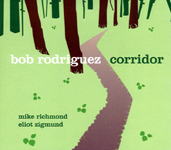
Corridor
CreOp Muse
By Tom Ineck
Add another name to those
distinguished jazz pianists who follow—with respect and
admiration—in the stylistic footsteps of Bill Evans. With
“Corridor,” Bob Rodriguez takes his place among such great
lyrical keyboard artists as Keith Jarrett, Richie Beirach, Fred
Hersch and Brad Mehldau.
Like those who came before,
Rodriguez seems most comfortable in the trio setting, here
receiving outstanding support and collaboration from the duo of
bassist Mike Richmond and drummer Eliot Zigmund.
The pianist’s prodigious
interpretative powers are most evident on the trio’s
covers—including Ellington’s “Prelude to a Kiss,” Coltrane’s
“Naima” and Rodgers and Hart’s “Spring Is Here.” He artfully
re-imagines “Prelude,” melodically, harmonically and
rhythmically. The listener recognizes the departure from
convention, but is drawn irresistibly along by the pianist’s
sense of adventure. In its elegiac introspection, Fritz
Kreisler’s “Liebesleid (Love’s Sorrow)” is a perfect fit with
the others.
Rodriguez also proves himself an
accomplished composer. The luxurious title track evolves for
more than nine minutes. After threatening to deconstruct early
on, it eventually arises like a triumphant Phoenix from the
ashes. Like the creative process that it describes, “Inside”
provides a vehicle for trio members to dig deep “inside” the
lovely chord changes for all the harmonic and melodic potential.
“It’s Not That Dark” begins with a classical interlude
that—indeed—seems dark and foreboding, but the mood brightens
somewhat as the tension is resolved. “Within the Line” comes as
close to going uptempo as anything here.
Richmond employs a resonant,
singing tone much like Jarrett’s longtime bassist, Gary Peacock,
and harking back to Evans sidemen Eddie Gomez and Scott LaFaro.
Zigmund is the epitome of taste, with skillful brushwork, a
measured gait, and only occasional, well-placed flourishes on
cymbals.
The entire disc is subdued, as
though by thematic design. Some may object to its total absence
of straight-ahead, up-tempo swingers, but given a chance, this
late-night listening experience is extremely rewarding.
top |
|
|
|
ROBERT
WALTER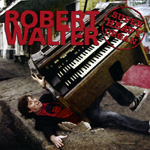
Super Heavy Organ
Magnatude Records
By Tom Ineck
“Super Heavy Organ” has seen
super-heavy rotation in my CD players over the last couple of
months, both at home and cruising around town. Hammond B-3
powerhouse Robert Walter creates some serious groove music,
suitable for any occasion.
The result also reemphasizes the
elemental soul inherent in the historic New Orleans music scene.
Although Walter is a recent transplant from the West Coast, the
solid rhythmic foundation is laid by Crescent City veterans
James Singleton on bass and Johnny Vidacovich, both of whom are
members of the great band Astral Project. Also adding to the
general funk atmosphere are drummer Stanton Moore of the
funk-groove band Galactic and tenor saxophonist Tim Green.
Vocalist Anthony Farrell adds his unique flavor on three tracks.
Of course, it is Walter’s
inspired playing on assorted keyboards—organ, piano, clavinet
and melodica—that binds these elements together on imaginative,
original tunes like “Adelita,” “Kickin’ Up Dust,” “El Cuervo,”
and “Cabrillo.” The irresistible drive of “Criminals Have a Name
for It” is aided and abetted by syncopated hand-clapping from
start to finish. The quirky “34 Small” pairs the organ and sax
on the melody line, accompanied by Vidacovich’s rattlesnake
brushwork and Singleton’s loping, sinister bass.
“Don’t Hate, Congratulate” is
music with a message, but it hasn’t lost its funky essence in
the process. Moore’s crackling drums are the key to “Big Dummy,”
setting the stage for Walter’s B-3 explorations and Green’s
stratospheric wails.
At times, Walter pushes the B-3
to its sonic limit, producing a monster sound that enters the
rock realm, especially on the cover of Jimmy Page and Robert
Plant’s composition “Poor Tom,” the only tune not written by the
organist. “Hardware” also comes on like a distant cousin of Led
Zep’s “Kashmir,” punctuated by Vidacovich’s signature street
beat and Singleton’s booming slurs.
Chased out of the Big Easy by
Hurricane Katrina a few months ago, Walter and company will
undoubtedly get back on their feet and continue to turn out
great music. It is hard to imagine them creating this feel
anywhere but New Orleans.
top |
|
|
|
MARK
SHERMAN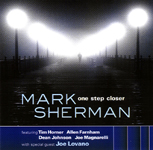
One Step
Closer
Consolidated Artists Productions
By Tom Ineck
Much of the music of
vibraphonist Mark Sherman is hard-edged East Coast bop—with a
difference. Sherman’s playing on vibes and marimba softens and
warms the effect, creating a delightful contrast in dynamics,
perhaps an essential sense of balance that he learned during his
six-year stint with singer Peggy Lee.
Among Sherman’s outstanding
fellow travelers on “One Step Closer” are Joe Lovano, whose
powerful blowing on tenor sax enlivens three of the 10 tracks,
trumpeter Joe Magnarelli, pianist Allen Farnham, bassist Dean
Johnson and drummer Tim Horner. This cream of NYC jazz stalwarts
rises to the top time after time.
The opener is “Modal Blues,” a
brawny, brawling bopper that features Lovano at his best.
“Little Lullaby,” on the other hand, is as gentle and engaging
as its title, with excellent interplay between Sherman and
Magnarelli on flugelhorn. Henry Mancini’s classic “Moon River”
is a showcase for Sherman’s sensitive ballad technique on vibes
and for Lovano’s bluesy take on an ageless tune.
“Spiritual Exercise” flexes its
upbeat muscle in a unison melody line pairing Sherman and
Magnarelli to great effect. The trumpeter soars in an extended
solo with echoes of Woody Shaw’s flamboyant assurance. Farnham
also delivers an inspired solo statement. The pianist
contributed two compositions, including the wonderful ballad
“Hope” and the lively, Caribbean-flavored “Genkitively,” a play
on “genki,” Japanese for “feelin’ good.”
Magnarelli’s flugelhorn plays a
prominent role on Sherman’s ballad “My Princess,” a memorable
tribute to the composer’s wife. Just when you thought nothing
new could be done with “My One and Only Love,” Sherman rethinks
the tune with emphasis on shifting harmonies on vibes,
flugelhorn and piano. The gently swinging Latin tune “Ella
Bella” is Sherman’s love song to daughter Ella. “Long Trip Home”
segues from a provocative introductory statement to another
lively romp with a Latin tinge, closing the CD with the same
gusto that opened it.
At age 48, Sherman is long
overdue for the level of recognition he so richly deserves.
Perhaps “One Step Closer” will truly be a big leap in that
direction.
top |
|
|
|
JIM SELF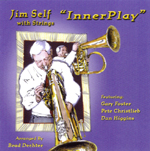
InnerPlay with Strings
Basset Hound Music
By Tom Ineck
Tuba player Jim Self got a
little recognition back in 1990, when Concord Records released
his “Tricky Lix,” a brassy barrage that was as much fun as the
title implies. Since then, his recordings have been relegated to
small labels with poor distribution.
He returns in earnest with “InnerPlay,”
a wonderful collaboration pitting the tuba and reeds with jazz
rhythm players and a 25-piece string section. Self is a bop
player with the highest credentials, including several years
with the great jazz innovator Don Ellis. Among his jazz cohorts
here are the superb saxophonists Pete Christlieb, Gary Foster
and Dan Higgins.
Rather than get in the way of
such strong improvisers, the strings—arranged by Brad Dechter—tastefully
enhance the overall harmonic palette and provide a comforting
contrast to Self’s bombastic instrument. (He also plays
something called a fluba, a hybrid of tuba and flugelhorn.)
The results are magic,
transforming such familiar tunes as Herbie Hancock’s “Speak Like
a Child,” Isham Jones’ “There Is No Greater Love,” Clare
Fischer’s “Pensativa,” and even Gershwin’s “I Loves You Porgy,”
which remains a ballad of exquisite beauty.
One of the most luxuriantly
arranged and performed pieces here is trumpeter Steve
Huffsteter’s “Cipriana,” a jazz waltz that allowed Dechter to
take full advantage of the many color variations inherent in
this mighty brass-and-string ensemble, including a soaring flute
solo by Foster. Self’s ballad “That Morning in May” deftly pairs
fluba with Higgins’ alto sax.
“The Underdog Has Arisen” is
Dechter’s tribute to Charles Mingus, and it has the appropriate
bluesy subtext, plus a typically terrific tenor solo by
Christlieb. Self’s chosen instruments—tuba and fluba
alike—contain a large dose of bombast by nature, but Self also
is capable of great lyricism and gentle warmth in his playing.
Witness his light touch, and virtuosic fingering, on Jobim’s
upbeat “No More Blues” and his punchy punctuation on Horace
Silver’s “Strollin’,” which also benefits from strong solo
statements by Foster on alto sax, Higgins on tenor, Dechter on
alto and Christlieb on tenor.
The grand finale is Self playing
with himself. That is, he overdubs the tuba four times for a
clever choral treatment of “Do You Know What It Means to Miss
New Orleans?” First, the strings lay down a lush carpet of sound
for Self’s initial solo, and then they set the scene for the
final “quartet” coda.
top |
|
|
|
JEFF BAKER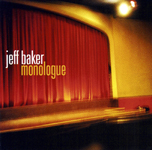
Monologue
OA2 Records
By Tom Ineck
For some fans of last year’s
“Baker Sings Chet,” this rapid follow-up will come as a pleasant
surprise. For others, it may be a bit of a letdown. There is no
denying this Baker’s affinity for that other Baker’s
idiosyncratic vocal sound, but his upper-register croon seems
less suited for some of the repertoire on “Monologue,” making
for mixed results.
Baker certainly has the
bandmates to make the most of any situation—saxophonist Brent
Jensen, pianist Bill Anschell, bassist Doug Miller, drummer John
Bishop and the wonderful addition of cellist David Sabee on two
tracks.
“That Old Feeling” gets an
updated treatment, courtesy of arranger Anschell, but Baker’s
reading seems inappropriate. Likewise, “You Don’t Know What Love
Is” lacks a certain bluesy, ballsy inflection. Baker is more
successful on his take of Nat Cole’s “Answer Me, My Love,” and
the wistful wartime ballad “A Nightingale Sang in Berkley
Square.”
Anschell and the band shine on
“I Didn’t Know What Time It Was,” imparting the muscular swing
of which Baker seems incapable. The singer returns to form on
the wrenching ballad “You Are Too Beautiful,” sensitively
accompanied by Farnham, Miller and Bishop. Jensen is the
stand-out player on the bouncy Latin arrangement of “The More I
See You,” while Baker is left in the dust by the band’s
exuberant performance.
Baker is definitely in his
element on “Come Ready,” a classical art song by contemporary
composer Richard Huntley and the highlight of this recording. A
gorgeous love song with exquisite chord changes and touching
lyrics, it provides Baker with a vehicle custom-made for his
delicate approach. Jensen, on soprano sax, heightens the effect
with a note-perfect solo. Tracy Chapman’s ballad “The Promise”
also is an excellent choice for Baker.
Baker’s vocal gift, while
limited, is undeniable. One hopes that eventually he will
develop a repertoire that takes full advantage of that gift.
top |
|
|
|
DAN THOMAS
QUINTET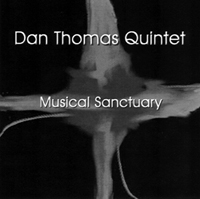
Musical Sanctuary
Dan Thomas Productions
By Tom Ineck
After experiencing a
life-threatening health crisis in 2004 (see the August 2004
issue of the BMF newsletter), Kansas City saxophonist Dan
Thomas was newly inspired to write music. The result, aptly
named, is “Musical Sanctuary,” a generous 68 minutes of new
music.
Retaining much of the same group
of KC musicians who have comprised his quintet over the last few
years, Thomas has assured that not only is this aggregation
musically compatible, but also capable to carry out his
often-complex musical assignments. Stalwarts Joe Parisi on
trumpet and flugelhorn, Roger Wilder on Fender Rhodes and piano
and bassist Bram Wijnands are joined by new drummer Mike Shanks.
Craig Akin occasionally subs for Wijnands on the electric and
acoustic basses.
“Toubanrut,” a nearly
unpronounceable reversal of “Turnabout,” opens the recording in
typically challenging—but swinging—fashion. Thomas and Parisi
(on muted horn) dart in and out of the blazing melody line in
perfect unison before allowing each of the principals to state
his solo case. “Professor RMW, Jr.” is, of course, a tribute to
friend, mentor and fellow University of Missouri-KC professor
Bobby Watson, who also wrote the liner notes, confirming their
mutual admiration.
The searching “Expressions”
takes on a fusion sound with Wilder’s electric keys and Akin’s
electric bass. By contrast, “Love Everlasting” is a tender
acoustic ballad that brings out the best in everyone, especially
Thomas on sax and Wilder on piano. “RSVP” revs up the band again
in hard-bop style, with Thomas firmly asserting his leadership
on tenor. Using mallets on tom-toms, Shanks establishes the
mystical quality of the title track, which segues into
“Selflessly Assured” and back to a reprise of the title theme
for a fascinating, 10-minute excursion.
Thomas shares the glory of
“Blues for BLT,” a driving bop tune with brief, but effective
solos by Thomas, Parisi and Wilder. “Walt’s Bop Inn” further
reinforces the band’s hard-bop credentials, as do the tricky
“With Two Endings” and the eight-minute “From Within,” a
sleight-of-hand masterpiece that showcases Parisi’s
muted-trumpet pyrotechnics.
A series of brief “Folktales
from Far East” are interspersed throughout the recording, as
though contrasting two of the world’s most important musical
traditions and inviting listeners to further explore this
“musical sanctuary.”
top |
|
|
|
WILLIE
MARTINEZ & LA FAMILIA SEXTET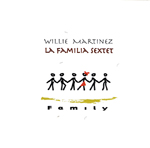
Family
Cuch be Witcha Productions
By Tom Ineck
For many years the music
director and timbales master with Norman Hedman & Tropique,
Willie Martinez in recent years has been striking out on his
own. His latest project is a typically rhythmic affair called
“Family,” which also features pianist Misha Tsiganov of
Tropique.
Martinez himself wrote eight of
the 10 tracks, but arranging credits go to the whole sextet.
“And Make It Snappy” seethes with Cuban fire, stoked by assorted
percussion instruments. “Sweet Pecan Pie,” by saxophonist Max
Schweiger, is a bluesy number in the funk tradition of Stanley
Turrentine or Lou Donaldson. Bassist Jennifer Vincent,
trombonist J. Walter Hawkes and Tsiganov take excellent solo
turns on “Mr. Mills.”
In the aptly named “A Stroll in
the Park,” Martinez creates a more pastoral—and fraternal—mood
as the horns state the melody in unison. Schweiger delivers a
tasteful, evenly paced baritone sax solo. Martinez showcases his
strong vocal talents on Luis Marquetti’s ballad “Plazos
Traicioneros,” also featuring a plangent, plunger-muted solo by
Hawkes.
“Say Hey Ray!” has that
irresistible forward motion of Tito Puente’s best work. Martinez
is especially effective, creating intricate polyrhythms on
drums. Shades of the blues also are apparent on “Shades of
Magenta,” which opens broodingly before accelerating for a wave
of percussion. “Makin’ Walt Run” is a complex bop workout that
has everyone rising to the challenge.
With “Family,” Martinez is one
step closer to establishing himself as a leader in the long
tradition of New York City’s great Latin bands.
top |
|
|
|
ALEX GRAHAM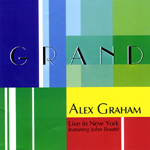
Grand: Live in New York
Featuring John Boutte
GH-002
By Butch Berman
I decided to catch up on my CD
reviewing while journeying west with my wife, Grace, on the
Amtrak California Zephyr. Amtrak, now the nadir of the abyss of
coast-to-coast traveling, may have started our trip out on the
wrong track, but our first choice of listening improved our trip
(no pun intended) in grand style.
“Grand,” the rockin’, swinging
and jazzy new release recorded live by alto saxophonist Alex
Graham at New York’s Smoke nightclub, really cooks and puts you
right there in the front row, grooving on the sounds.
This hybrid of styles, emanating
from a seven-piece band (including Alex), filtered through a
love of New Orleans-tinged tunes and showcasing the wonderful
vocalizing of John Boutte, captures a hot night in the “other”
city of jazz…New York City.
Smoke has a “rep” for featuring
top-notch players, and Alex and his gang were no exception. An
eclectic set list mixing standards like “I Cover the Waterfront”
with the likes of “Basin Street Blues” and Fats Domino’s rock
‘n’ roll hit, “I’m Walkin’,” all leave room for amazing blowing
from the cats in the band, and Mr. Boutte is a gem. Shades of
Jimmy Scott come to mind, but he’s got his own thing goin’. His
writing ability also shines with “At the Foot of Canal Street,”
as does Graham’s “Blues for K.”
Alex is the musical director at
Mackinac Island’s famed Grand Hotel, where he first met up with
John Boutte. Likewise, the other musicians all have ties to the
Musser family-owned Michigan hotel and Graham’s tutelage. He
took over the position in 2001 after developing his chops in New
York in the ‘90s.
Soulful, sultry, singing with a
snappy rhythm section that keep your toes a-tappin’ and
horn-playing that puts a smile on your face long after you’ve
heard it and put the CD back on the shelf, it is,
indeed…“Grand.”
top |
|
|
|
JOHN McNEIL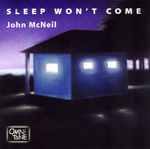
Sleep Won't Come
OmniTone
By Butch Berman
Many years ago the great Oakland-based, horn-driven soul band
Tower of Power wrote an anthem song/satire on hipness called
“What is Hip?” Well, I’d always rather be considered hip over
being “square,” but when I think of “hip,” or as they used to
say “hep,” three jazz musicians I’ve met or worked with over the
years define this term. One is bassist Dennis Irwin, and another
is vocalist Giacomo Gates.
However, if I’d had to pick the “beatest” of ‘em all, it would
have to be my old pal, and one hell of a trumpet player, John
McNeil. And guess what? If I had to pick one of the best new
jazz releases out in a long time that I can’t get off of my CD
player, it would have to be John’s ode to insomnia, “Sleep Won’t
Come.”
Recorded and produced by John on Frank Tafuri’s wonderful record
company, OmniTone, this stellar work of art only strengthens an
already rich and deep catalog of jazz masterpieces.
I’ve always been a night person, and rarely have had long-term
bouts of sleeplessness. My wife, Grace, however, does suffer
from this dilemma, so I can relate and sympathize with John’s
obvious dealings with angst and torment. Yet, as most artists of
his magnitude do, he transfers his pain into a textured web of
gorgeous, lush collection of personal stories/songs, mostly
written by him.
Recording as a drummerless trio, his choice of bandmates fit
this project to a T. Holding down the bass responsibilities,
Kent McLagan moves, shifts, sways and swings within this
framework like a bullfighter. Strong, masterful, yet tender when
called for to lull you into the dream world that McNeil lives in
during the wee, wee hours of the beautiful realm of madness he
draws his creativity from.
Rounding out this killer threesome is the Denver-based keyboard
wizard, Jeff Jenkins. Jeff wrote two of the wistful,
ever-so-jazzy creations on this project, and joins forces with
McNeil to pen two others. He’s a stylist on the move, and a
player to watch as his career continues to expand. He probably
doesn’t get much sack time either. Still, this lovely disc
captures the interplay between these guys ever so cleverly. Not
a caffeine-laden experience at all, as John’s muted horn reminds
you at times of Miles, but his own brand of genius continues to
impress with each album he puts out.
It
is possible that the twisted tune “Polka Party” might have had a
pot of coffee brewing… or something. Their rendition of the
traditional “The Water is Wide” may be my favorite track, but no
foolin’, as they say in the ‘hood…It’s all good. As a matter of
fact, this collection of recorded music will stand the test of
time as one of the great ones. Grab it!!!
top |
|
|
|
NORMAN HEDMAN’S TROPIQUE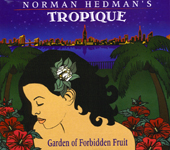
Garden of Forbidden Fruit
Power Light Records
By Tom Ineck
Norman Hedman’s Tropique has scored another artistic success
with the band’s latest release, an exotic blend of instrumental
workouts and vocal gems. Yet to receive the popular acclaim it
so richly deserves, this aggregation continues to grow musically
with sheer persistence and a healthy dose of creativity.
Lending their continued support to the band’s consistent sound
are pianist Misha Tsiganov, bassist Ron Monroe, timbales wizard
Willie Martinez, flutist Craig Rivers and alto saxophonist Sam
Furnace, in his last recording with the group before his
untimely death last year. Relatively new to the band is
vibraphonist Alexei Tsiganov, who also contributed the spirited
opener, “Rundadar Dance.” Tropique’s former vibes player, A.J.
Mantas, appears only on the closer, Hedman’s “Island Spice.”
Hedman continues to write most of the tunes, and his talent for
constructing memorable melodies and irresistible rhythms has not
flagged. Among the best here are the lively “Cutting Loose,”
“Because I Can,” “It’s Just Not the Same,” with a great
contribution by Brad Mason on flugelhorn, and the romantic
ballad “Walk in the Moonlight.” Furnace contributes some
marvelous playing on Hedman’s “Feeling My Way.”
Vocal duties are shared by several notable guest artists.
Soulful songstress Ada Dyer raises the funk factor on “Closer,”
and singer James D-Train Williams caresses the lyrics of “Angel
of the Night,” written by Hedman and the late pianist James
Williams and dedicated to Butch Berman and his wife, Grace. The
rhythmic title track vocal is handled with an appropriate
sensuality by Dani Stevenson, and Kendra Shank, a longtime BMF
friend, contributes a wordless vocal on the breezy “Wherever U
R.”
With “Garden of Forbidden Fruit,” Norman Hedman’s Tropique
maintains its strong ensemble sound. Hedman leads with
authority, shaping the band’s direction with original
compositions and adding his own percussive spice on congas.
top |
|
|
|
ALAADEEN
New Africa Suite
ASR Records
By Tom Ineck
True to its title, “New Africa Suite” is rife with African
rhythms. That is evident from the percussion intro to the
opener, “Grace,” another recent composition dedicated to Butch
Berman and his Nigerian wife of the same name. In all, Ahmad
Alaadeen has written seven original tunes that hold together
well and justify the “suite” designation.
On
both tenor and soprano saxophones, Alaadeen’s sound most closely
resembles the African-influenced excursions of John Coltrane,
Pharoah Sanders, Archie Shepp and other progressive players of
the mid-1960s. A funk element is added on “Beneath Where Rives
Flow,” with some outstanding piano work by Harold O’Neal,
bassist Seth Lee and drummer Donivan Bailey.
Like Coltrane, Alaadeen’s music contains a deep, warm current of
spirituality and universal brotherhood, especially on the
gorgeous “Salaam, Shalom, Peace.” The initial tenor statement is
beautifully expanded on by O’Neal at the piano. “The Burning
Sand” is a propulsive, start-and-stop exercise fully utilizing
Alaadeen’s leaping soprano lines and piercing tone.
“Home Again” dances to the swaying, alternating rhythms of
Alaadeen’s full-bodied tenor, giving the tune the feel of a
blues waltz. Again, O’Neal contributes a wonderful solo by
building on the inherent finger-popping pulse. The funk element
returns with “The Jannah Now,” which features Alaadeen on
soprano, fronting a slightly different but equally capable
lineup that includes pianist Christopher Clarke, bassist Tyrone
Clark and drummer Michael Warren.
Another unifying factor is the varied percussion work
contributed by Ray Stewart throughout this very satisfying
musical experience.
top |
|
|
|
JOHN STOWELL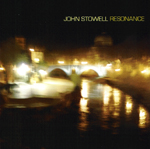
Resonance
Origin Records
By Tom Ineck
In
effect, “Resonance” is a collection of intimate, first-take
ruminations by a master guitarist. Whenever Portland, Ore.,
luthier Mike Doolin created a new acoustic instrument, he
invited his friend John Stowell to come over and give it a try,
while the tape rolled. The resulting 13 tracks, recorded over
five years on assorted six-string and 12-string models, make for
fine listening in a gentle, relaxed mood.
Stowell’s disciplined, classical approach is balanced by an
adventurous spirit, especially in his choice of harmony chords
and transitional melodic runs. He remains true to the spirit of
such standards as Jerome Kern’s “Nobody Else but Me” and
“Yesterdays,” Duke Ellington’s “Prelude to a Kiss,” and Sammy
Cahn’s “I Should Care,” while stretching their improvisational
potential.
John Coltrane’s “Equinox” gets a particularly lush and
authoritative reading on 12-string guitar. Stowell, obviously
liberated by this solo setting, turns Irving Berlin’s “How Deep
is the Ocean” every which way but loose. On an eight-minute
treatment of Leonard Bernstein’s “Some Other Time,” Stowell
makes the 12-string instrument sparkle and shine with shimmering
bell-like tones. The lesser-known tunes “Picture in Black and
White” by Antonio Carlos Jobim and “Peau Douce” by Steve Swallow
are interesting program choices.
Stowell also contributes several original compositions to the
mix, as if creating a new vocabulary with which to explore an
instrument’s range and tone. “Ron’s Return/Eclipse,” shifts
rhythmic gears midway through, and “Bolero Algorhythm” has the
mathematical precision of its namesake. Stowell’s “I Wish” is
romantically linked in medley with Cole Porter’s lovely
“Everything I Love.” His brief tune “Maybe Later” ends the
recording on a wistful note.
Kudos go to Stowell and Doolin for recognizing the inherent
potential of recording these diverse pieces, and to Origin
Records for releasing them.
top |
|
|
|
TSIGANOV BROTHERS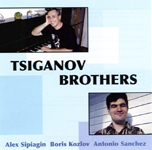
Tsiganov Brothers
By Tom Ineck
The
brothers Tsiganov—pianist Misha and vibraphonist Alexei—have
established a reputation in the rhythmic realm of Latin jazz as
members of Norman Hedman’s Tropique, and they show no desire to
break out of that mold on their debut, self-produced recording,
although here the influence is largely Brazilian.
It
is a well-balanced affair. The brothers share and share alike,
each contributing five compositions and both getting time for
solo expression. Like Tropique, however, the brothers have
created a recognizable sound that seems to favor the ensemble
over the individual.
Helping to define the quintet’s group sound are Alex “Sasha”
Sipiagin on trumpet and flugelhorn, Boris Kozlov on bass, and
Antonio Sanchez on drums. Sipiagin is especially effective,
often stating the melody in unison with Alexei’s vibes. His
brassy horn cuts through everything else and sets the tone on
such tunes as Alexei’s “Rio De Corea,” Misha’s “She Lives in
Brazil,” Alexei’s gentle ballad “Just a Bossa,” and Alexei’s “My
Brazil.”
“That Unpredictable Eugene,” was written by Misha and first
recorded with Tropique several years ago. It maintains its Latin
tinge even without the congas and timbales so essential to
Tropique’s sound. “Don Arcadon” is another of Misha’s lively
Latin excursions, featuring an irresistible rhythmic pulse and a
soaring trumpet solo. Likewise, his composition “Passing By” is
a fine vehicle for the flugelhorn, but also offers the composer
a chance to show his piano skills.
Misha and Alexei are accomplished jazz improvisers, which makes
for some lively interplay as they trade licks on their
respective instruments. Essentially, the piano and the vibes are
both percussive keyboards, so they allow the Tsiganov brothers
to work closely, rhythmically and harmonically. Kindred spirits,
indeed.
top |
|
|
|
THE HOT CLUB OF SAN FRANCISCO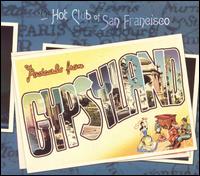
Postcards from Gypsyland
Lost Wax Music
By Butch Berman
Many imitators to the throne originated by Django Reinhardt and
Stephane Grappelli’s first Quintet of the Hot Club of France
proclaim to be worthy of the “Hot Club” title. There’s probably
a Hot Club of Peoria out there by now. Nevertheless, in my
opinion, next to Django… there is only one true purveyor of this
fine delicate art of gypsy jazz, and that falls into the most
talented hands of “Pazzo,” aka Paul Mehling and his Hot Club of
San Francisco.
I invited Paul and his band with the coolest shoes in the world
to be one of the headliners at the 2005 Topeka Jazz Festival in
Kansas. They took the Midwestern crowd of jazz lovers, not
accustomed to their specific style of music, to the limit both
sets, deriving deserved standing O’s each time, a rare feat
indeed in Topeka. When I told Paul between shows how righteously
incredible this current crop of cats were to me, a fan of nearly
a decade, he said this 2005 lineup, consisting of Evan Price,
also an alumnus of the Turtle Island String Quartet, on violin,
bassist Ari Munkres, and rhythm guitar maestros “Sammo” Miltich
and Josh Workman, were indeed his best group ever.
I was in total agreement! When you hear their newest WAX release
“Postcards from Gypysland,” I’m sure you’ll go along with my
statement wholeheartedly.
Capturing the same masterful virtuosity, ultra warmth and subtle
humor of their live performances, this CD conveys it all.
Employing obscure originals from the Hot Club of France
songbook, Paul and his merry men infuse carefully chosen
standards along with contemporary compositions written mainly
for this sparkling array of pros.
All songs included are lovely and memorable, with their ode to
Victoria Spivey’s, “Spivy,” “Zeppo” Price’s wedding gift of song
to “Pazzo,” entitled “Alle Prese con une Verde Milonga” and
their Ravel-inspired “Pavane Pour une Infante Defunte” standing
out as my personal faves.
I love every CD they’ve put out, and “Postcards from Gypsyland”
is no exception. Definitely a must have!
top |
|
|
|
Odds and Ends
A grab bag of releases are recommended
By Butch Berman
Listening to music for the first time is kinda like trusting
your original impressions you form when you first meet someone.
Usually your instincts are on the mark, but occasionally it
takes a second or sometimes even a third encounter to truly own
your feelings surrounding whatever or whomever you come across.
This same rule also applies to listening to music.
I
probably receive more than 100 titles each year from mostly
talented hopefuls requesting my time and consideration. I
occasionally hit or miss the mark. The BMF may have been
financially involved with someone who required our attention
first, so again some artists who deserved more recognition got
put aside for awhile, or left out all together. I apologize to
the individuals who fell into those categories.
Let
me list several excellent CDs that I hope are still available by
some very competent cats for your listening approval, and as
additions to your collections.
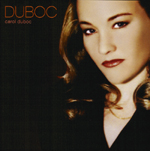 Anything
by Carol Duboc, a new sultry, sassy young lady who sings and
writes jazz for lovers—and lovers lost—with a penchant for Latin
grooves. I think she has three releases out, all good, but Duboc,
recorded in 2002, touched and moved me the most. Formally a
K.C. gal, info on obtaining her stuff can be found by clicking
on www.carolduboc.com Anything
by Carol Duboc, a new sultry, sassy young lady who sings and
writes jazz for lovers—and lovers lost—with a penchant for Latin
grooves. I think she has three releases out, all good, but Duboc,
recorded in 2002, touched and moved me the most. Formally a
K.C. gal, info on obtaining her stuff can be found by clicking
on www.carolduboc.com
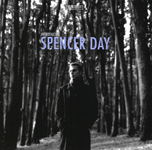 Introducing
Spencer Day by Spencer Day is a very soulful and jazzy CD by this San
Francisco-based singer/songwriter/pianist. He truly covers the
waterfront, putting his unique mark on a variety of styles and
genres while gently sweeping you up and enveloping you on his
musical journeys. The incredible selection of covers chosen for
this album wowed me completely with their stark contrast to each
other, and all mixed in so cleverly among his own tunes (or
should I say song-poems?) that prove to be deep and compelling.
How often can we groove to “Blame It on My Youth,” “The Green
Leaves of Summer,” and “Oh, Lady Be Good,” all on one sphere?
Contact him at info@spencer day.com Introducing
Spencer Day by Spencer Day is a very soulful and jazzy CD by this San
Francisco-based singer/songwriter/pianist. He truly covers the
waterfront, putting his unique mark on a variety of styles and
genres while gently sweeping you up and enveloping you on his
musical journeys. The incredible selection of covers chosen for
this album wowed me completely with their stark contrast to each
other, and all mixed in so cleverly among his own tunes (or
should I say song-poems?) that prove to be deep and compelling.
How often can we groove to “Blame It on My Youth,” “The Green
Leaves of Summer,” and “Oh, Lady Be Good,” all on one sphere?
Contact him at info@spencer day.com
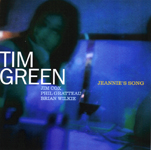 Jeannie’s
Song by Tim Green on OA2 22015 is the second wonderful CD
this Illinois-based piano stylist has put out on this label’s
ever-growing catalog of hot bops and swinging sounds. Backed
again by his great rhythm section, consisting of my good friend
Jim Cox (who’s getting hitched soon…major congrats to you and
yours) on bass and drummer Phil Gratteau. The addition of
guitarist Brian Wilkie to six of these nine all-killer,
no-filler selections works like a charm. I loved the first trio
album a whole bunch, and it took me a moment or two to get used
to the quartet format. Wilkie, ever so much a demon of the
strings, truly adds another dimension to this already-tight
unit. Tim, I anxiously await your third artistic endeavor. Jeannie’s
Song by Tim Green on OA2 22015 is the second wonderful CD
this Illinois-based piano stylist has put out on this label’s
ever-growing catalog of hot bops and swinging sounds. Backed
again by his great rhythm section, consisting of my good friend
Jim Cox (who’s getting hitched soon…major congrats to you and
yours) on bass and drummer Phil Gratteau. The addition of
guitarist Brian Wilkie to six of these nine all-killer,
no-filler selections works like a charm. I loved the first trio
album a whole bunch, and it took me a moment or two to get used
to the quartet format. Wilkie, ever so much a demon of the
strings, truly adds another dimension to this already-tight
unit. Tim, I anxiously await your third artistic endeavor.
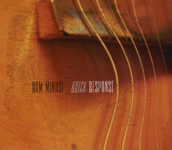 Quick
Response by Dom Minasi on CDM Records rounds out this group
of jazz recordings worth hearing and owning. Minasi’s a very
astute New Yorker whose recorded guitar work stretches back to
his Blue Note era during the ‘70s, three critically acclaimed
“indie” outpourings, a stint with Dr. Lonnie Smith in the ‘80s,
another decade of gigging and wood-shedding and now this
extremely vibrant new CD with a very potent new band. Organist
Kyle Kochler is the perfect foil for Dom and alto saxophonist
Mark Whitecage to create their magic with. Kyle’s driving pedal
work combining with drummer John Bollinger’s crafty propulsions
create a jazzy canvas for Dom and Mark to paint their musical
murals on. Most tunes are penned by Minasi and click
immediately. I was totally taken aback by the insightful choice
of the old rock ballad by Leiber and Stoller, “I Who Have
Nothing” that showcases this band’s startling versatility. Quick
Response by Dom Minasi on CDM Records rounds out this group
of jazz recordings worth hearing and owning. Minasi’s a very
astute New Yorker whose recorded guitar work stretches back to
his Blue Note era during the ‘70s, three critically acclaimed
“indie” outpourings, a stint with Dr. Lonnie Smith in the ‘80s,
another decade of gigging and wood-shedding and now this
extremely vibrant new CD with a very potent new band. Organist
Kyle Kochler is the perfect foil for Dom and alto saxophonist
Mark Whitecage to create their magic with. Kyle’s driving pedal
work combining with drummer John Bollinger’s crafty propulsions
create a jazzy canvas for Dom and Mark to paint their musical
murals on. Most tunes are penned by Minasi and click
immediately. I was totally taken aback by the insightful choice
of the old rock ballad by Leiber and Stoller, “I Who Have
Nothing” that showcases this band’s startling versatility.
And there, my friends and fans, you have it.
Enjoy, and be happy.
top |
|
|
|
ELDAR
DJANGIROV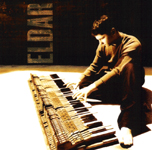
Eldar
Sony Classical
By Tom Ineck
Eldar Djangirov’s piano
virtuosity, the analogies to Art Tatum and Oscar Peterson and
the increasing recognition by fellow jazz musicians, nationwide
audiences and recording companies come as no surprise to those
of us who were first
awestruck by the young prodigy’s talents at the 1998 Topeka Jazz
Festival, when he was just 11 years old. Back then, he was
virtually unknown outside the Midwest.
At 18, Djangirov has a hot new
CD in the stores, his first on a major label, and boasting
bassist John Patitucci and a guest appearance by tenor
saxophonist Michael Brecker. He has retained longtime sideman
Todd Strait on drums. Strait and Kansas City bassist Gerald
Spaits accompanied Djangirov on his two previous, locally
produced CDs.
With “Eldar,” Djangirov has
positioned himself for a rapid rise up the mainstream jazz
charts, bursting forth with his trademark flag-waver “Sweet
Georgia Brown,” in which the rhythm section drops out as he
accelerates to a tempo that only Tatum and the piano gods could
imagine. As if to assure his listener that he’s capable of great
restraint and sensitivity, he begins the ballad “Nature Boy”
playing a subdued role, with Patitucci first stating the melody.
At times, Djangirov’s unaccompanied playing seems almost
dreamily detached from the changes, veering into impressionistic
flourishes. Strait sits this one out.
In contrast, the trio emphasizes
the rhythmic and soulful aspects of Bobby Timmons’ “Moanin’.”
Djangirov playfully inserts discordant notes and percussive
block chords, alternately increasing the intensity and lowering
it to a whisper, sustaining the suspense throughout the tune’s
nearly eight-minute length. Brecker joins the fray on the
pianist’s composition “Point of View,” an uptempo romp that
begins with piano and tenor stating the complex theme in unison
before Djangirov and Brecker take their respective solos.
Two more Djangirov originals
follow in rapid succession. The lovely “Raindrops” employs
cascading chords stated by piano and bass in unison, suggesting
the influence of classical impressionism. The solo piano
rendition of “Lady Wicks” seems even more indebted to the
classical realm, with its early waltz-like cadence and
modulating harmonies.
Herbie Hancock’s “Maiden Voyage”
receives a powerful, two-fisted reading by Djangirov, who has
always favored Hancock’s adventurous melodic flights. Here he
extends the form with racing upper-register runs and percussive
punctuation. Strait heightens the effect, riding the cymbals and
taking a thunderous solo.
Another of the young pianist’s
idols is Thelonious Monk, who is represented by two consecutive
tracks, beginning with an exquisitely slow “’Round Midnight,” in
which Djangirov explores implied harmonies while remaining
faithful to the original. Patitucci adds a lyrical bass solo.
“Ask Me Now,” on the other hand, is a high-spirited exercise in
stride piano technique with some aptly comic touches.
Fusing “Watermelon Man” and
“Cantaloupe Island,” Djangirov arrives at his own “Watermelon
Island,” another adventurous paean to Hancock and his influence
on the young admirer. The set ends with a relaxed Latin-tinged
take on “Fly Me to the Moon,” with Djangirov embellishing the
familiar lines with fanciful right-hand runs and full-blown
orchestral flourishes.
It is a measure of Djangirov’s
musical maturity that four of the 11 tracks are originals,
holding their own with a program of well-known standards. Thanks
to Sony Classical and its far-reaching publicity and
distribution network, the world soon will know what we’ve been
saying for seven years. Eldar Djangirov is going places.
top |
|
|
|
BOBBY
WATSON & HORIZON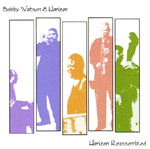
Horizon Reassembled
Palmetto Records
By Tom Ineck
At long last, one of the great
jazz combos of the last 20 years has returned to the recording
studio and a series of concert appearances. An all-star
aggregation, Horizon is ostensibly fronted by saxophonist
extraordinaire Bobby Watson, but it is a democratic outfit in
the true sense of the word, each member contributing to the
whole.
Especially essential to the mix
is Watson’s longtime friend and colleague, the brilliant drummer
Victor Lewis. The rest of this dynamic quintet consists of
trumpeter Terell Stafford, pianist Edward Simon, and bassist
Essiet Essiet. Together again on “Horizon Reassembled,” released
in late 2004, they sound as if they had never parted company. As
Watson himself writes in the liner notes, “in the jazz world,
commitment to a cause and a sound is paramount.”
That old familiar sound is
instantly recognizable on Watson’s medium-cool opener, “Lemoncello,”
the kind of lyrical, uplifting tune for which the composer is
known. Simon penned “Pere,” an intense, complex Latin ramble
that is further intensified by Stafford’s fiery bravura solo and
Lewis’ inventive and perpetual polyrhythmic attack.
Pamela Watson, a talented
composer who has contributed many tunes to her husband’s
recordings, wrote the sadly romantic ballad “The Love We Had
Yesterday,” which Watson on alto sax turns into a thing of great
beauty and grace. Jimmy Heath’s classic “Ginger Bread Boy” gets
a typically sparkling, energetic treatment from Horizon, led by
the dual horns of Watson and Stafford.
Simon leaps into the Latin lilt
of Watson’s title track with flair, setting the pace for the
rest of the band, which enters en masse before breaking into
exuberant solo statements, as if to shout from the rooftops,
“Horizon Reassembled!” Burt Bacharach’s romantic ballad “The
Look of Love” is treated with care and sensitivity at a
slower-than-usual tempo. As composer, Lewis’ sole composition is
the insistent “Eeeyyess,” whose title perfectly expresses its
celebrative mood, as reflected in Stafford’s growling,
plunger-muted trumpet solo.
“Permanoon” is another uptempo
tour de force, with the ensemble stating the melody. Watson
takes off on a solo flight with Simon laying down some great
keyboard comping before taking his own place in the solo
spotlight. Stafford follows with a solo that builds in
intensity. All of this is kept under strict rhythmic control by
Lewis and Essiet.
Watson’s “Dark Days” is a
mournful tune with only brief glimpses of sunlight through the
darkness. Could this be a musical impression of the post-9/11
world in which we live? Essiet’s African roots are clearly heard
in his closing composition “Xangongo,” an inspiring tune whose
contrapuntal construction brings out the best in his bandmates.
To get a good sense of what
Horizon is all about, Watson suggests listening to the CD five
times, each time concentrating on the work of an individual
player. Not a bad idea, but why stop after five listens?
Bobby Watson and Horizon are
headlining the 2005 Topeka Jazz Festival on Memorial Day
weekend. It is a show not to be missed.
top |
|
|
|
GREG ABATE
QUINTET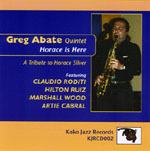
Horace Is Here: A Tribute to
Horace Silver
Koko Jazz Records
By Tom Ineck
Along with Art Blakey, Horace
Silver is the undisputed architect of hard bop, also known as
post-bop. Silver’s development of the soulful, propulsive
extension of bebop began in the 1950s and has influenced several
generations of modern, mainstream composers, bandleaders and
instrumentalists.
Saxophonist Greg Abate is
solidly in that hard-bop lineage, as exemplified by his latest
release, a tribute to Silver that also contains two Abate
compositions in the Silver style, the title track “Horace is
Here” and “On the Road.” Set in the classic bop quintet format,
the session also features trumpeter and longtime Abate comrade
Claudio Roditi, pianist Hilton Ruiz, bassist Marshall Wood and
drummer Artie Cabral.
All the usual Silver suspects
are here. “Filthy McNasty” kicks things off with its bluesy
swagger and illustrates the compatibility of the front-line
horns with Ruiz on piano. Each solo builds on the one that
precedes it. Abate and Roditi creatively harmonize the difficult
changes of “Nica’s Dream,” and “Song for My Father” gets the
respectful reading it so richly deserves.
The shifting tempos of
“Nutville” bring out the best in the rhythm section as they
deftly maneuver the changes and propel soloists Abate, Ruiz and
Roditi at breakneck speed. Though the pace slows again on
“Silver’s Serenade,” Abate delivers an astounding alto solo that
explores all the theme’s possible variations.
At nearly 10 minutes, “Peace” is
the artistic centerpiece of this recording. Bassist Wood briefly
states the melody before handing it over to Abate on alto, who
is then joined by Roditi before the trumpeter makes his own solo
statement. Ruiz also contributes another sterling solo
performance. “May Reh” and “Quicksilver” close the recording
with a display of technical virtuosity and soulful vitality that
Silver would appreciate.
Even Abate’s own contributions
seem at home here. The title track is a breezy, mid-tempo number
featuring Ruiz on a long, cascading piano statement that
establishes the mood for Abate’s eloquent tenor sax response and
Roditi’s warm, lower-register trumpet. “On the Road” swings with
bluesy brawn, again featuring the composer on tenor.
In many ways—rhythmic, harmonic
and melodic—it is Ruiz who is the glue that binds this project.
Never merely a timekeeper, an accompanist or a soloist, he
masterfully handles all three roles with aplomb.
Recent years have yielded plenty
of tribute recordings to Horace Silver, but few achieve the
faithful mood and mighty performance chops of Abate’s homage.
With no tune less than six minutes and a total time of nearly 74
minutes, “Horace is Here” is a heaping helping of hard bop,
indeed.
There’s only one complaint about
this recording. From the moment I set the disc spinning, I
noticed that the overall sound was muffled and lacked dynamics
in the upper (piano and cymbals) and lower (bass) ranges. It
improved somewhat after increasing the volume, but better
engineering would have brightened the sound and emphasized the
dynamics inherent in this music.
top |
|
|
|
KEVIN
MAHOGANY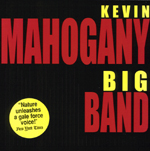
Big Band
Zebra Records/Mahogany Jazz
By Tom Ineck
Out of the recording limelight
since 2000’s “Pride and Joy” on Telarc Jazz, Kevin Mahogany
returns with an impressive big band venture on his own label.
“Big Band” was compiled from sessions recorded in Chicago,
Englewood, N.J., Kansas City, Mo., Belleville, N.J., and
Brooklyn, N.Y.
That geographic diversity
allowed a number of great instrumental soloists to participate,
including pianists James Williams and Ramsey Lewis, trumpeters
Bobby Shew, Roy Hargrove, Danny Barber, tenor saxophonists Pete
Christlieb, Scott Robinson, Bob Sheppard and Pat LaBarbera, and
alto saxophonists Kim Park, Craig Treinen and Jon Gordon.
Several arrangers were involved, most prominently the late Frank
Mantooth of Garden City, Kan., who also fronted his own
orchestra on six of the 10 tracks.
Mantooth created an easy funk
groove for the opener, “Moonlight in Vermont,” with brassy
section work and a wonderful tenor solo by Robinson. “It Don’t
Mean a Thing” gets a swaggering Afro-Cuban rhythmic treatment
and fiery solos by Christlieb and Barber. The bluesy
“Centerpiece” is aided and abetted by Park and Shew, while Lewis
lends his soulful, two-fisted keyboard style to the imaginative
Mantooth arrangement of the old Leroy Carr blues “In the
Evening.”
Mahogany belts out “One for My
Baby” in the classic Big Band ballad tradition. Regardless of
the material, his soul roots are never far from the surface, and
he uses them to good effect. “Three Little Words” is not the
1930 pop hit by Bert Kalmar-Harry Ruby, but a Mahogany
composition that appeared on the singer’s 1993 CD “Double
Rainbow” and also was included on Mantooth’s 1999 Sea Breeze
release “Miracle.”
Don Sickler arranged “Dear
Ruby,” the lyric version of Thelonious Monk’s “Ruby, My Dear,”
with a flugelhorn solo by Hargrove. “There Will Never Be Another
You” features the Kansas City Boulevard Big Band” in a swinging
arrangement by Dan Gailey, and “It’s Alright With Me” is
performed by the Big City Swing Jazz Band, with an arrangement
by pianist Allen Farnham and Veronica Martell in a duet with
Mahogany. In a departure from the big band support, James
Williams duets brilliantly with the singer on “Don’t Get Around
Much Anymore,” another example of the late pianist’s skill and
sensitivity. He died July 20 last year.
“Big Band” is as much a tribute
to the arranging and band-leading talents of Mantooth, who died
Jan. 30, 2004, as it is a tribute to Mahogany’s powerful vocal
presence. It takes a robust, confident voice to front a big band
with authority, and Mahogany possesses such a voice.
top |
|
|
|
STAN
KESSLER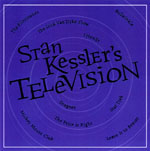
Stan Kessler’s Television
By Tom Ineck
Kansas City trumpeter Stan
Kessler has hit on a gimmick—jazz treatments of popular TV
themes—but this is a gimmick that also has considerable artistic
merit.
You know you’re in for a fun
ride when Kessler and co-conspirators Jake Blanton on guitar,
Mark Lowrey on keys, Jeff Harshbarger on bass and Tim Cambron on
drums launch into the “Bullwinkle” theme, creating a moose of a
different color. We boldly explore another galaxy when “Star
Trek” is taken at a dance-ready Latin tempo, and the Cleavers
have the blues with Kessler’s shuffling take on “Leave It to
Beaver.”
It’s not just the facts, ma’am,
when the gang tackles the “Dragnet” theme with a fusion sound
reminiscent of early ‘70s Miles Davis. In fact, the only
giveaway to identify the tune is the “dum-da-dum-dum” opening
statement. Lowrey on electric keys and Kessler on Harmon-muted
trumpet excel on this eight-minute improvisation. Perhaps the
strangest of all is the ballad rendition of the “Mickey Mouse
Club” theme, with Kessler’s flugelhorn wrenching every bit of
emotion from those classic lyrics: “Hey there! Hi there! Ho
there! You're as welcome as can be. M-I-C-K-E-Y M-O-U-S-E.”
And then there’s “The
Flintstones,” perhaps as Ornette Coleman would interpret it,
“The Price Is Right” as a bouncy little funk number reminiscent
of Chuck Mangione, and the surf guitar and space-age electronics
of “The Dick Van Dyke Show” theme.
Only one of the nine selections
falls flat in this context, perhaps because it’s at least 30
years newer than the rest. The “Friends” theme is pleasant
enough, but it just doesn’t seem to fit in with those wacky and
wonderful TV tunes of the ‘50s and ‘60s.
top |
|
|
|
DAVE SCHNITTER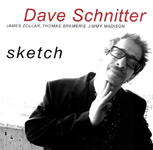
Sketch
DMix Records
By Butch Berman
Almost every CD review has a
story. I don’t know too many other Butches besides myself. It
was a trip on my answering machine to have another Butch call
back Butch. It turns out Lincoln Journal Star reporter Butch
Mabin’s wife is the sister of Dave Schnitter, a terrific sax
player formerly living in Europe and now back in New York. We’re
mutual friends of Bobby Watson, another monster on sax, and he
lives in the same musicians’ complex as my “brother,”
percussionist Norman Hedman. It’s a small world, for sure, and
in the jazz scene it’s even tinier.
Anyway, we met on the phone,
gabbed and his promo arrived very quickly. Wow! What a great
jazz experience. Hands down, it’s one of the truest forms of the
best in recorded jazz music I’ve heard this year, and maybe
longer than that. I just couldn’t get if off of my CD player,
and EVERYONE (mostly other musicians) felt the same way about
“Sketch.”
A pianoless quartet featuring
Dave just killing on tenor, James Zollar blowing some fine
trumpet, acoustic bassist Thomas Bramerie and drummer Jimmy
Madison providing the perfect rhythm section for this incredible
collection of tunes. Dave also shows off his prowess composing
four of the eight selections. Zollar adds one with the album
closer, “Sputnik,” and their take on the three standards chosen
to round out this set—“For All We Know.” “All or Nothing at All”
and “You Don’t Know What Love Is”—are so cleverly crafted you
feel you just discovered these great songs for the first time.
Schnitter, an alumnus of Art
Blakey’s Jazz Messengers, is amazingly well schooled in the
post-bop tradition and handles the ballads with the same kind of
romantic intensity of Dexter or perhaps even Ben Webster, yet
with a special twist that gives his music a personal
identification that sounds like no one else.
From the first few moments of
the opening cut, “Dili Dali,” you will be well aware you’re
going on an adventuresome excursion to perhaps somewhere a
little bumpy, maybe even a little bit dangerous. Don’t be
afraid… just sit back, buckle-up and hold on to a most enjoyable
ride. To purchase “Sketch” and get more info, visit Dave’s
website at
www.daveschnitter.com.
top |
|
|
|
DICK MORGAN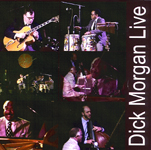
Dick Morgan Live
Foxhaven Records
By Butch Berman
I first heard of Dick Morgan
when I received a note from his bassist and agent Dick Einhorn
asking if I’d be interested in receiving his promo to book him
at any of my concerns either in Nebraska or Kansas. Well, on my
first listen I felt he’d be great for my shows. Then I checked
him out again and REALLY dug his sophisticated, swinging
style—so much so that I wanted to share this CD with you in my
column.
Recorded live at the 1996 East
Coast Jazz Festival, Washington, D.C.’s famed jazz pianist Dick
Morgan and his band hit a groove so tight… these cats must have
been giggin’ together for years. Along with Morgan and Einhorn
are guitarist Steve Abshire, drummer Bertell Knox and
percussionist Sam Turner. Obviously performing for a festival
crowd, this set of standards still catches fire, as all players
under Dick’s suburb tutelage have chops aplenty, employing
astounding dynamics throughout.
Morgan truly is a commanding
leader. Erroll Garner, Oscar Peterson and Earl Hines come to
mind, but Dick has his own thing going. He’s a little dramatic
and always bluesy, with a touch of gospel and a love of the best
of American contemporary music that gives him a broad palette to
create from.
You’ve heard this set list
hundreds of times—“My Funny Valentine,” “Battle Hymn of the
Republic,” “Somewhere,” “Bridge Over Troubled Waters,” etc., yet
this talented unit can challenge untested waters even in these
ole chestnuts and make you love ‘em all over again. This is the
perfect CD to play at cocktail parties, or just kickin’ off your
shoes, lightin’ up and enjoying a beverage while digging a most
enjoyable musical adventure.
To purchase this CD and for more
information, visit www.dickmorganjazz.com.
Dick Morgan live…indeed!!!
top |
| |
|


 Anything
by Carol Duboc, a new sultry, sassy young lady who sings and
writes jazz for lovers—and lovers lost—with a penchant for Latin
grooves. I think she has three releases out, all good, but Duboc,
recorded in 2002, touched and moved me the most. Formally a
K.C. gal, info on obtaining her stuff can be found by clicking
on www.carolduboc.com
Anything
by Carol Duboc, a new sultry, sassy young lady who sings and
writes jazz for lovers—and lovers lost—with a penchant for Latin
grooves. I think she has three releases out, all good, but Duboc,
recorded in 2002, touched and moved me the most. Formally a
K.C. gal, info on obtaining her stuff can be found by clicking
on www.carolduboc.com Introducing
Spencer Day by Spencer Day is a very soulful and jazzy CD by this San
Francisco-based singer/songwriter/pianist. He truly covers the
waterfront, putting his unique mark on a variety of styles and
genres while gently sweeping you up and enveloping you on his
musical journeys. The incredible selection of covers chosen for
this album wowed me completely with their stark contrast to each
other, and all mixed in so cleverly among his own tunes (or
should I say song-poems?) that prove to be deep and compelling.
How often can we groove to “Blame It on My Youth,” “The Green
Leaves of Summer,” and “Oh, Lady Be Good,” all on one sphere?
Contact him at info@spencer day.com
Introducing
Spencer Day by Spencer Day is a very soulful and jazzy CD by this San
Francisco-based singer/songwriter/pianist. He truly covers the
waterfront, putting his unique mark on a variety of styles and
genres while gently sweeping you up and enveloping you on his
musical journeys. The incredible selection of covers chosen for
this album wowed me completely with their stark contrast to each
other, and all mixed in so cleverly among his own tunes (or
should I say song-poems?) that prove to be deep and compelling.
How often can we groove to “Blame It on My Youth,” “The Green
Leaves of Summer,” and “Oh, Lady Be Good,” all on one sphere?
Contact him at info@spencer day.com Jeannie’s
Song by Tim Green on OA2 22015 is the second wonderful CD
this Illinois-based piano stylist has put out on this label’s
ever-growing catalog of hot bops and swinging sounds. Backed
again by his great rhythm section, consisting of my good friend
Jim Cox (who’s getting hitched soon…major congrats to you and
yours) on bass and drummer Phil Gratteau. The addition of
guitarist Brian Wilkie to six of these nine all-killer,
no-filler selections works like a charm. I loved the first trio
album a whole bunch, and it took me a moment or two to get used
to the quartet format. Wilkie, ever so much a demon of the
strings, truly adds another dimension to this already-tight
unit. Tim, I anxiously await your third artistic endeavor.
Jeannie’s
Song by Tim Green on OA2 22015 is the second wonderful CD
this Illinois-based piano stylist has put out on this label’s
ever-growing catalog of hot bops and swinging sounds. Backed
again by his great rhythm section, consisting of my good friend
Jim Cox (who’s getting hitched soon…major congrats to you and
yours) on bass and drummer Phil Gratteau. The addition of
guitarist Brian Wilkie to six of these nine all-killer,
no-filler selections works like a charm. I loved the first trio
album a whole bunch, and it took me a moment or two to get used
to the quartet format. Wilkie, ever so much a demon of the
strings, truly adds another dimension to this already-tight
unit. Tim, I anxiously await your third artistic endeavor. Quick
Response by Dom Minasi on CDM Records rounds out this group
of jazz recordings worth hearing and owning. Minasi’s a very
astute New Yorker whose recorded guitar work stretches back to
his Blue Note era during the ‘70s, three critically acclaimed
“indie” outpourings, a stint with Dr. Lonnie Smith in the ‘80s,
another decade of gigging and wood-shedding and now this
extremely vibrant new CD with a very potent new band. Organist
Kyle Kochler is the perfect foil for Dom and alto saxophonist
Mark Whitecage to create their magic with. Kyle’s driving pedal
work combining with drummer John Bollinger’s crafty propulsions
create a jazzy canvas for Dom and Mark to paint their musical
murals on. Most tunes are penned by Minasi and click
immediately. I was totally taken aback by the insightful choice
of the old rock ballad by Leiber and Stoller, “I Who Have
Nothing” that showcases this band’s startling versatility.
Quick
Response by Dom Minasi on CDM Records rounds out this group
of jazz recordings worth hearing and owning. Minasi’s a very
astute New Yorker whose recorded guitar work stretches back to
his Blue Note era during the ‘70s, three critically acclaimed
“indie” outpourings, a stint with Dr. Lonnie Smith in the ‘80s,
another decade of gigging and wood-shedding and now this
extremely vibrant new CD with a very potent new band. Organist
Kyle Kochler is the perfect foil for Dom and alto saxophonist
Mark Whitecage to create their magic with. Kyle’s driving pedal
work combining with drummer John Bollinger’s crafty propulsions
create a jazzy canvas for Dom and Mark to paint their musical
murals on. Most tunes are penned by Minasi and click
immediately. I was totally taken aback by the insightful choice
of the old rock ballad by Leiber and Stoller, “I Who Have
Nothing” that showcases this band’s startling versatility.